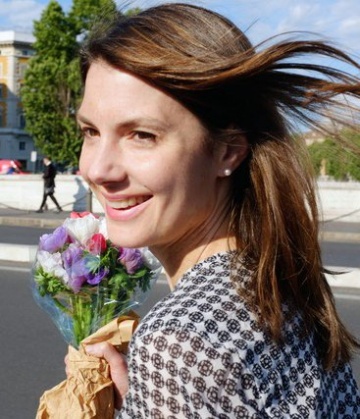Columbia College | Columbia University in the City of New York
“The Director’s Assistant,” by Rebecca Prime ’96
When I was 23, I landed my dream job. Novelist Paul Auster ’69, GSAS’70 was directing a movie and I was to be his assistant for the course of the production. During a sometimes-lonely junior year abroad in France, I’d fallen hard for Auster’s books, and had even felt moved to write a heartfelt letter to the author, which fortunately I never sent. Now, in a stroke of New York City’s special serendipity (or a lucky choice of internship, depending on how you choose to look at it), I was to spend the next six months working alongside my literary crush.
The film, Lulu On the Bridge (1998), was set to begin production in late October. I was still living up near Columbia, an hour-long subway ride from Auster’s home in Park Slope. As his assistant, I needed to be available from dawn to dusk during production and Paul (as he insisted I call him) worried about how this long commute would make an arduous schedule even more taxing. We arrived at the solution that I would live with him and his family during the week, returning to my apartment on the weekends. And thus a love affair began.
To be clear, the affair was chaste, unrequited and included Paul’s wife, writer Siri Hustvedt; daughter, singer Sophie Auster (at the time a precocious 9-year-old); and their book-filled brownstone. From my vantage point as an uncertain young woman with vague literary aspirations, the view before me was one to marvel at. Naturally I was star-struck, not only by Paul and Siri but by the world they inhabited. In Paul’s home office, I noted a postcard from Michael Ondaatje, a fax from Wim Wenders, drawings by Art Spiegelman that weren’t New Yorker covers. But beyond the allure of celebrity, I was entranced by the Austers’ family life and what it suggested adulthood and marriage could be. Trying to keep up with Paul and Siri’s dinner conversation, their interwoven intellects on full display, I felt both awe and longing.

Paul Auster ’69, GSAS’70 on the set of Lulu on the Bridge with actress Mira Sorvino.
movie-roulette.com
Instead, I was fascinated by the people for whom this was normal life. Working 12-hour days with the same set of people for months at a stretch breeds a sense of community and intimacy; your world becomes subsumed into that of the production. It was an unusual lifestyle and I was intrigued by those who chose it, like Ernie, a small man with greying curls and warm brown eyes. Trained as a wildlife biologist, Ernie had worked at Gerald Durrell’s famous zoo in the Channel Islands. How had he ended up a lowly location scout? It hadn’t occurred to me that people with grey hair could still be figuring out their path in life, or choosing paths that might not offer conventional markers of success.
Looking back, I’m amazed by how oblivious I was to the enormous stress that accompanies any film production, where time is literally money. I remember the director of photography valiantly chugging Pepto-Bismol in the hopes of subduing his stomach flu so that the day’s shoot could proceed on schedule. One of the producers had a new baby, so overtime for her meant not only going over budget, but needing to run home to nurse. Most of all, I remember Paul, already up and pacing the floor at 5 a.m., his habitual smoker’s cough transforming into a shocking, sonorous hack as the shoot progressed.
I observed these adults from the distance of my youth, lacking the life experience for my sympathy to extend to empathy.
After the production wrapped, I said my farewells to the Austers and moved back uptown. The beguiling interlude was over and I began to make my own choices, for better and for worse. I left New York, following the turns in my own path to Los Angeles, where I earned a Ph.D. in film studies. As a film historian, I’m still fascinated by the mysterious alchemy of making movies, but appreciate that my investigations can be conducted from the comparative comfort of the archives or my desk. And when I visit New York, the city has yet another layer to it — the fictional New York we created that fall on equal footing with reality in my memories.

More “Lion’s Den”
- 1 of 5
- ›

